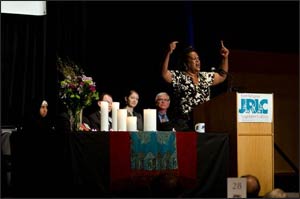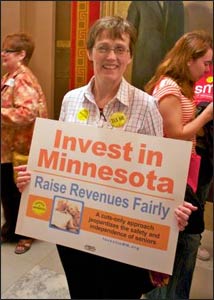By Angela Butel
MINNESOTA INTERFAITH LOBBY COLLABORATES AROUND SHARED CONCERNS
Disagreement seems to be the norm in politics these days. From what to do about the fiscal cliff and the right way to balance budgets to foreign policy decisions and health care, consensus is nowhere to be found. Compromise is a teeth-grinding, inch-by-inch process.
Religious communities, like politicians, are infamous for disagreeing with each other. Clashes, all too often violent, over ideology and doctrine share headlines with political arguments; frequently, the two go hand in hand.

So how could an organization ever bring together different religious communities in agreement on political issues? In fact, the Joint Religious Legislative Coalition of Minnesota has been doing it for more than 40 years. JRLC represents a rather unique model of interfaith community – a political one.
JRLC was founded in 1971 as the first interfaith public-interest lobby group in the United States. It remains the largest organization of its kind in the country. It is sponsored by four bodies – the Minnesota Catholic Conference, the Minnesota Council of Churches, the Jewish Community Relations Council of Minnesota and the Dakotas, and the Islamic Center of Minnesota. With an Executive Board of four representatives from each sponsor, JRLC identifies timely policy issues that are important to all of the faith traditions. After articulating policy positions, it draws on an extensive network of congregations and individuals from across Minnesota to take action on those issues.
Jumping in to Make a Difference
I learned of JRLC through involvement in other interfaith organizations and was immediately struck by its different approach. The Interfaith Youth Core and my college’s Multifaith Council both focused on bringing people of different faith backgrounds together around shared values, such as compassion and a commitment to serve others. JRLC, by contrast, explores the concrete manifestations of these shared values, asking people of faith to make commitments, based on those values, to take action on pressing political issues.
I spent a year volunteering with JRLC as an Emerging Organizer, learning the basics of interfaith community organizing. This involvement evolved into an internship continuing into my final semester of college. Growing involvement with JRLC strengthened my conviction that the concrete, active cooperation that JRLC generates is crucial both to interfaith work and the democratic process.
Interreligious lobbyists in Minnesota’s State Capital
JRLC transformed my understanding of what community organizing means. Yes, organizing looks like bringing together 800 people, representing different faiths, from across Minnesota for a day each year at the state capitol. Their assignment? To meet with legislators about important upcoming issues.
Organizing also looks like ducking out of the biting Minnesota wind into a coffee shop to meet with someone, listen to her stories, share some of mine, and build the beginnings of a relationship that will allow me to discover our shared interests even as I learn to respect our differences. Hundreds of these personal connections build up to the 800-person gathering at Day on the Hill each year. Community organizing is interfaith work at its core: based on an understanding that, although we come from different places and believe different things, we can accomplish more by working together than by working at odds.
JRLC volunteers at work on policy issues.
Last semester, I witnessed JRLC’s process in action as staff members and the Board worked on creating a new issue paper on payday lending in the state. A Minneapolis congregation had identified the practice as a serious problem in its own neighborhood; the predatory lending practices of payday lending agencies were trapping people in a cycle of debt. JRLC decided to take on the issue, defining a policy standpoint in keeping with the teachings of the Abrahamic faith traditions on usury.
The result was an issue paper explaining the phenomenon of payday lending and condemning as “simply unconscionable” practices that take advantage of people in vulnerable situations. The process of bringing all of JRLC’s board members and sponsoring bodies into agreement on the paper did not proceed without disagreement. The ensuing discussion, compromise, revision, and eventual acceptance, however, made for a stronger paper and represents an inspiring affirmation of the fact that consensus is possible.
Now, at the start of a new year and a new legislative session, is JRLC’s busiest time of the year. The organization draws on networking and policy research to effect change in the political process at the state level. Major issues for JRLC this session include:
- the Family Economic Security Act, a package of reforms that would include raising the minimum wage, expanding child care supports for working families, and increasing tax credits for working parents with children;
- allocating sufficient funding to support the Safe Harbors Act, which would create programs and supports for victims of human trafficking in Minnesota;
- tax reforms that would promote fairness and help the state regain solid financial footing; and
- a constitutional amendment to ensure that Minnesota judicial elections remain free from partisan influence.

JRLC staff along with activists from across the state representing a wide spectrum of faith traditions will engage their legislators, expressing their viewpoints on these important issues and promoting changes that will provide the chance for lives of dignity for all Minnesota residents.
JRLC’s model of interfaith action is a unique one – asking faith traditions to come together not only in a social or moral community, but in a political one. This model of interfaith community is challenging because it asks each individual to bring their multiple identities – religious and political – into an arena where they may clash with the identities of others, and then asks everyone to work together in mutual respect and love.
JRLC’s forty-year history of successfully promoting change in Minnesota’s political landscape is a testament to the possibilities inherent in this challenge.



